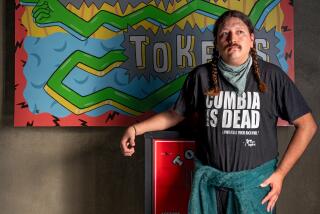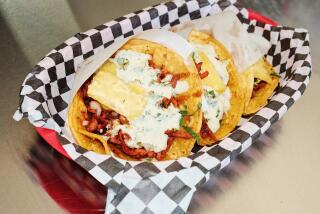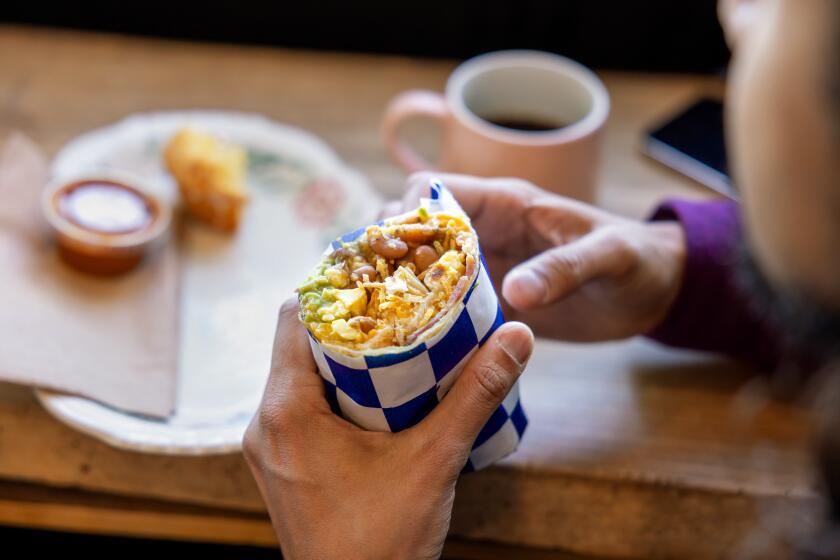Cole’s serves a slice of history
You won’t find many restaurants that display photos of 1950s strippers. But Cole’s, the dark, subterranean eatery that recently reopened near the corner of 6th and Main, believes in tradition.
“It wasn’t that far to walk to see the girls performing,” explained spokeswoman Joan McCraw, referring to the old Follies Theater.
Gangster Mickey Cohen “was dating one of those girls,” she added. Cole’s “was his hangout.”
For a while it seemed as though the curtain had fallen on Cole’s. It shut down in March 2007 after 99 years of business. What went wrong? Perhaps it was the depressed state of the neighborhood. Or maybe the owners violated the house rule printed on a dining room sign: “We do not extend credit to stockbrokers.”
At one point during its shuttered period, a website carried this capsule review of Cole’s by one diner:
“Pro: No lines. Con: It’s closed.”
To the rescue came bar owner Cedd Moses, a fan of the eatery since he was a child. The son of artist Ed Moses, he and some other investors reopened Cole’s last December and were careful to retain its original elements: bordello-red wallpaper, Tiffany glass lampshades over the mahogany bar, penny-tiled floor, an ancient time clock, and friendly reminders to customers.
“Ladies, kindly do your soliciting discreetly,” one sign reads.
While Cole’s can no longer claim to be the longest continuously operated cafe/saloon in the city, it’s still arguing with Philippe the Original over who invented the French dip sandwich.
Cole’s lore has it that the dish originated in 1908 when a customer with a bad case of sore gums asked for his sandwich to be lowered into the juice because the French roll was too crunchy for him. The sympathetic chef complied, word spread and soon this variation was even being ordered by folks who flossed regularly.
Philippe’s, which opened the same year and later moved to its current location near Union Station, maintains that it invented the dip when a customer complained that his roll was stale and asked for it to be dunked. Or perhaps a chef dropped the roll into the juice in the roast pan and the customer said, what the heck, give it to me anyway. No one at Philippe’s is quite sure.
And, as a city historian admitted to the L.A. Business Journal a few years ago, “We don’t have a French dip department.”
Oh well. Said Richard Binder, co-owner of Philippe’s, “Who knows what happened 100 years ago? We’re just happy to still be around.”
Cole’s occupies the bottom floor of the 10-story Pacific Electric Building, the city’s tallest skyscraper in the early 1900s and for years the terminus for the Red Car trolley line, which clacked over more than 1,000 miles of track in Southern California.
Founder Henry Cole moved into the former headquarters of some horse-drawn streetcars. One of the first things he did was sprinkle sawdust on the floor.
Located near the financial center of the city, the place became a haunt for bankers, attorneys, newspaper types and politicians -- as well as more respectable folks.
Business really started booming when Cole opened a free check-cashing service, the city’s first, in a cage at the back of the restaurant. The shrewd owner realized that customers would often be returning a portion of the cash to pay for their lunch and/or drinks.
His son Rawland managed the check-cashing business and developed a code to deal with possible bad-check passers. “Johnny,” the son would call to a waiter, “did you get the prescription filled?” And the waiter would summon police to grab the suspect, who wasn’t always a stockbroker.
Cole’s vintage outdoor sign still displays the word “payroll,” but the “checks cashed” part was removed long ago, lest new customers think the service is still offered. “We’d have a line around the block,” pointed out manager Jana Green.
Prohibition, which dawned in 1919, was a bit of a problem. But the late Jimmy Barela, who tended bar there for 56 years, substituted bitters (at 3 cents a shot) and “near beer” (at a dime a glass) for the real stuff.
All that changed April 7, 1933, when President Roosevelt legalized beer. Barela told The Times years ago that “we sold 58 32-gallon kegs” on the day.
Though the furnishings of Cole’s recall another era, Moses is hoping to attract loft dwellers and other new downtown residents with some upscale touches.
Spokeswoman McCraw, for instance, speaks of “elevating the cocktail experience” and “the perfect execution” of ice picks required for such classic alcoholic concoctions as Hemingway’s Death in the Afternoon and the 1926 Cosmopolitan.
“We have real bartenders, not actor/bartenders,” she added.
Too bad Mickey Cohen isn’t around anymore. One can imagine the mobster admiring the handiwork of the bartenders with their ice picks.
--
More to Read
Eat your way across L.A.
Get our weekly Tasting Notes newsletter for reviews, news and more.
You may occasionally receive promotional content from the Los Angeles Times.










